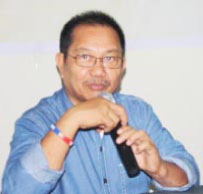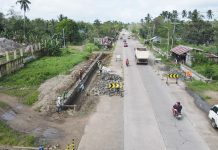
SOGOD, Southern Leyte – The move of the government to revive the abaca industry has sparked hope to San Vicente village chief Oscar Alcotes, who witnessed how people in their community struggled after diseases sent abaca farming back to year zero. “Fibers are now gone but we will never abandon our farms because this was how my parents supported us. We are happy that the new administration listens to our plea,” said Alcotes, 49.
Alcotes recalled that in the early 2000, nobody was poor in their village as people reap the fruit of lucrative abaca farming. When abaca mosaic and bunchy top diseases infested their farms, many people lost hope and some even left to Cebu or Manila to find jobs. “Although I only own a small farm, I remember earning up to P10,000 during harvest season,” he recalled. Due to meager income from planting alternative crops, no one among his three children completed college education after finishing high school. The village chief is just one of the hundreds of abaca farmers who personally heard Department of Agriculture Secretary Emmanuel Piñol last week committing P100 million for the revival of abaca industry in this town this year.
It is part of DA’s P2 billion budget left for 2015 that needs to be expended by the end of 2016 or else it will be reverted to the national treasury. Out of the P100 million, P50 million is allotted for the immediate procurement of planting materials, which will cover about 1,500 hectares. The plan is to immediately assist the farmers by buying planting materials from them using the local abaca variety, which is thriving well in the area. “There is a great demand for abaca all over the world and there are only three countries producing it – Philippines, Ecuador, and Costa Rica. We really have to exploit new opportunities in front of us, as far as abaca is concerned,” Piñol said during his visit to this town last week. The allotment fulfills Piñol’s promise to this abaca-producing town during his “biyaheng bukid” last month.
Philippine Fiber Development Authority Regional Director Wilardo Sinahon said they will conduct intensive technical training on production of abaca planting materials, disease management, accurate fertilizer application, proper planting distance, and cultural management practices. In addition to free planting materials, the national government will also provide organic fertilizers to recipient farmers in this town. Sinahon is very optimistic that with the P100 million budget, Sogod will be able to restore its production in the next few years. “The fresh funding support for this town is 14 times more than the current P7 million abaca disease eradication budget for the region’s six provinces,” he added. Sogod is the top abaca producing town in Southern Leyte with about 6,000 hectares devoted to abaca cultivation. About 2,000 of 6,000 abaca farmers in the province are based here. (SARWELL Q.MENIANO)



